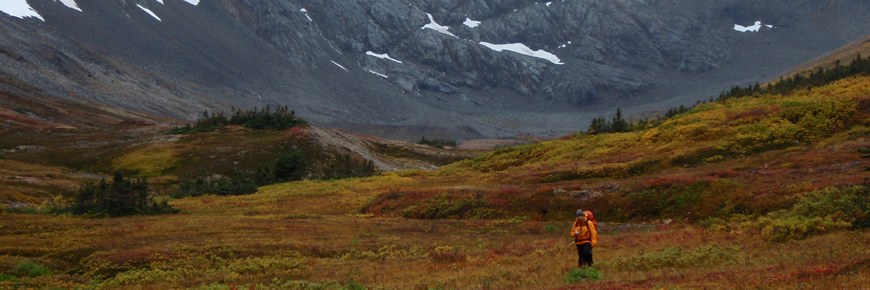
Outside of the summer hiking season, there are no regular patrols, the route is unmarked and facilities are not maintained. Up-to-date information on trail conditions is no longer available. Fall hikers need to be self sufficient and accept a high level of responsibility for their own safety.
To register for fall hiking on the Canadian Side, please complete the Fall Registration Form (PDF, 55 Kb) and submit to Parks Canada with at least 48 hours notice of departure. Contact Parks Canada at 1-800-661-0486 or U.S. National Park Service in Skagway (907-983-9200) to confirm registration.
Self reliance | Emergencies | Route finding | Weather | Avalanche hazard | Bears | Designated camping | Park regulations
Self reliance
Chilkoot Trail National Historic Site is a remote wilderness park. Natural hazards are present in the area. If you are not experienced in winter travel, or do not carry essential safety equipment and camping gear, or travel alone, you are limiting your chances of survival if you have an accident.
- Never travel alone.
- Let someone know your plans. Leave an itinerary, route map and the names of your party members with a friend or family member and ensure that they have the emergency contact numbers.
- Recognize and know how to treat hypothermia, frostbite, etc.
- Carry survival gear, i.e., extra food, clothing, matches, etc.
Emergencies
There is limited emergency response. You must be entirely self-sufficient and able to handle any emergency situations on your own. In the event of an emergency you should be prepared for lengthy delays in search and rescue response times due to weather conditions and/or the availability of both aircraft and rescue personnel. Medical or rescue assistance may be several days away.
Communication
There is no cell phone coverage in Chilkoot Trail National Historic Site. We recommend you carry a satellite communications device. Be aware that coverage can be adversely affected by vegetation and topography in some locations.
The closest telephone is at Canada Customs at Fraser on the South Klondike Highway (6.5 km/4 miles south of Log Cabin parking lot). Let the dispatcher know that you are in the Chilkoot Trail National Historic Site, and then give your precise location and the accident details.
Parks Canada Emergency Dispatch
Via satellite phone: 1-780-852-3100
Via satellite messaging device: Use the SOS function in the event of an emergency, and your service provider will connect Parks Canada Emergency Dispatch to you.
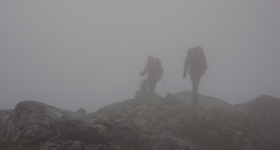
Route finding
The trail and routes to Chilkoot Pass are not marked and not readily identified during the off-season. Route finding skills are necessary.
Carry a map and compass or GPS in case of whiteout conditions and especially if unfamiliar with the area.
Weather
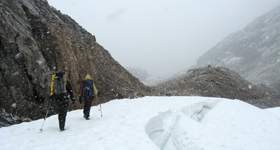
Mountain weather is highly unpredictable. It can change quickly and/or vary greatly from one location to another. Fall hikers can expect wet, cold, windy and/or whiteout conditions; severe rain or snow storms are possible. Fall weather is wet; daylight hours are short and nights are cold (often below freezing).
Most weather systems blow in from the coast. As a result the US side of the trail tends to be rainy and prone to flooding. The section of the trail between Sheep Camp and Deep Lake is above tree line and frequently experiences severe weather conditions - driving rain, sleet, hail or snow, low temperatures, high winds and fog - as weather systems move through the area.
Avalanche hazard
Avalanches are a natural phenomenon, which may occur during any season along the trail. Extreme avalanche conditions often exist between Sheep Camp and Deep Lake. Campgrounds may be unsafe. Extreme avalanche conditions can also develop elsewhere in the park given the right set of conditions, i.e., slope, terrain, weather and snow-pack composition. Fall hikers are responsible for their own evaluation of snow stability, avalanche hazards, and decisions concerning campsite and route selection.
Bears
The Chilkoot Trail is located in an area home to both black and grizzly bears. In the fall, salmon are running, berries are ripe and there is frequent bear activity along the trail. Do not leave packs unattended.
Familiarize yourself with the principles and practices of safe travel in bear country.
Designated camping
Camping is allowed in designated campgrounds only. Camp only in designated campsites. Cook and eat in shelters or at picnic tables. Do not cook or eat at tent platforms.
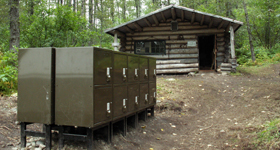
Food storage lockers, or “bear boxes”, are provided at each campground. Immediately upon arrival in camp: stow all food and other attractants. Ensure the door is securely latched.
Open fires are prohibited. Carry a backpacking stove and plenty of fuel. A wood stove is available at each of the day-use shelters at Lindeman, but wood supplies may be scarce and/or wet. There are no other wood stoves on the Canadian side of the trail.
Surface water is the only source of drinking water on the Chilkoot Trail. There are places to get water at all campgrounds. Purify all drinking water.
Pack in - pack out
You must pack out everything that you pack into the park. Keep your meals simple and light -- this will cut down on the weight you carry in and the garbage that you will have to carry out.
Waste water disposal
Never wash clothes, dishes, or yourself directly in a water source. Waste water is disposed of differently on the American and Canadian sides of the trail:
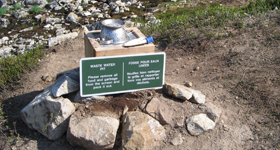
U.S. side: Toss waste water into the fastest flowing part of the river.
Canadian side: Use wastewater disposal pits, located in all campgrounds and at Chilkoot Pass. Be sure to clean food waste off the screen and pack it out with your garbage.
Human waste
Outhouses are located in every campground and at Chilkoot Pass. Toilet paper is not supplied.
Park regulations
-
Do not remove or disturb cultural resources
Destroying, damaging, collecting or removing cultural or natural resources is an offence under U.S. and Canadian national park regulations:
- Do not handle artefacts: bottles, cans, boots and other “stuff”
- Stay on the trail and paths in campgrounds to reduce trampling of cultural landscape features such as terraces, foundations and rockwork.
- Do not move rocks around in campgrounds or use them to anchor your tent. Rocks are often the remnants of Gold Rush era structures.
- Do not collect, move or remove any natural resources such as plants, animals and rocks. Note: Berry picking for immediate consumption is permitted on the U.S. side of the trail. Berry picking is not permitted on the Canadian side.
-
Do not disturb, feed or entice wildlife
Do not leave packs unattended.
- When stopping, keep your packs together and ensure someone always keeps them within arm’s reach.
Use food/garbage storage devices.
- Immediately upon arrival in camp, i.e. before selecting your tent site, securely stow all attractants including: food, trash, fuel, stove, pots, dishes, utensils, toiletries and first aid kit.
- Food storage lockers, or “bear boxes”, are provided at each campground. Ensure the door is securely latched.
For details on food handling protocols, visit Bear safety.
-
Do not pollute
- Pack out all garbage/food waste.
- Use grey water pits where provided.
For details on waste disposal, visit Water and waste.
-
Cook and eat only in designated areas
- Designated areas are cooking shelters and picnic tables.
- Do not cook or eat at tent platforms.
- Never bring food or other attractants to a tent site.
-
Camp only in designated campsites
- No camping in shelters
- Carry cord to help secure tents to platforms
- Do not use stones or cobbles to secure tents because they may belong to historic building foundations
-
No campfires
Open fires are prohibited on the Chilkoot Trail. Bring your own backpacking stove and fuel for cooking. There are wood stoves in most shelters below the treeline, but wood supplies may be scarce and/or wet.
On the U.S. portion of the trail:
- Collect “down and dead” wood only
- Do not cut live or standing trees for firewood
On the Canadian portion of the trail:
- Firewood is provided
- Collecting wood is prohibited.
-
Pets must be on a leash at all times
We recommend you do not take your pets on the trail. However, if you choose to do so:
- Pets must be kept on a leash at all times
- Pets are not allowed in cooking shelters
- Do not take pet food to your campsite or leave it unattended: store it in the bear boxes with your food and other attractants
- Clean up after your pet; dispose of pet feces in the outhouses
-
Fishing is restricted
- An Alaska State fishing license is required along the U.S. portion of the trail
- Fishing and fishing gear are prohibited on the Canadian portion of the trail
-
Metal detectors, firearms and mountain bikes are restricted
- Metal detectors, firearms and mountain bikes are prohibited on the Canadian portion of the Chilkoot Trail.
Related links
- Date modified :